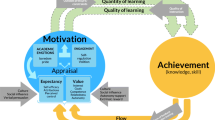Abstract
Change in 4,119 students' freshman to senior ratings of four educational philosophies (vocational, academic, collegiate, and nonconformist) provided four measures of educational impact. Repeated measures analyses of variance compared changes in philosophy as a function of Greek affiliation, controlling for sex, historical era, major, parents' education, scholastic aptitude, and academic motivation. Small but significantly different degrees of change in the collegiate and nonconformist philosophies suggested that Greek affiliation increased social interests and inhibited some forms of intellectual interests. These small differences across all students masked the moderating effect of major. In the nonconformist philosophy, for example, the Greek × major interaction reflected substantial Greek–independent differences among humanities majors, and progressively smaller differences or reversals among social science, physical science, and engineering majors. Possible interpretations of this interaction are offered.
Similar content being viewed by others
REFERENCES
Astin, A. (1977). Four Critical Years: Effects of College on Beliefs, Attitudes, and Knowledge. San Francisco: Jossey-Bass.
Baird, L. L. (1969). The effects of college residence groups on students' self-concepts, goals, and achievement. Personnel and Guidance Journal 47: 1015–1021.
Bohrnstedt, G. (1969). Conservatism, authoritarianism, and religiosity. Journal of College Student Personnel 10: 36–43.
Clark, B. R., and Trow, M. (1966). The organizational context. In T. M. Newcomb and E. K. Wilson (eds.), College Peer Groups: Problems and Prospects for Research (pp. 17–70). Chicago: Aldine Publishing Co.
College Entrance Examination Board. Scholastic Aptitude Tests, Verbal and Mathematical. Princeton, NJ: Educational Testing Service.
Dollar, R. (1966). Student characteristics in choice of housing. Journal of College Student Personnel 7: 147–150.
Educational Testing Service (1965). College Student Questionnaires, Parts 1 and 2. Princeton, NJ.
Fricke, B. G. (1963). Opinion, Attitude and Interest Survey, OAIS Handbook: A Guide to Personality and Interest Measurement. Ann Arbor: Evaluation and Examinations Division, University of Michigan.
Johnson, E. (1970). Sophomore fraternity members compared with independents on the biographical scales of the CSQ. Journal of College Student Personnel 11: 284–285.
Lozoff, M. M. (1968). Residential groups and individual development. In J. Katz and Associates (eds.), No Time for Youth: Growth and Constraint in College Students (pp. 255–317). San Francisco: Jossey-Bass.
Pascarella, E. T., and Terenzini, P. T. (1991). How College Affects Students. San Francisco: Jossey-Bass.
Peterson, R. E. (1965). On a typology of college students. Research Bulletin 65-9. Princeton, NJ: Educational Testing Service.
Rose, H. A., and Elton, C. F. (1971). Sorority dropout. Journal of College Student Personnel 12: 460–463.
Rosenthal, R. (1994). Science and ethics in conducting, analyzing, and reporting psychological research. Psychological Science 5: 127–134.
Scriven, M. (1964). The structure of the social studies. In G. W. Ford and L. Pugno (eds.), The Structure of Knowledge and the Curriculum (pp. 87–105). Chicago: Rand McNally.
Segal, B. E., (1965). Fraternities, social distance, and anti-Semitism among Jewish and non-Jewish undergraduates. Sociology of Education 38: 251–256.
Terenzini, P. T., and Pascarella, E. T. (1977). An assessment of the construct validity of the Clark-Trow typology of college student subcultures. American Educational Research Journal 14: 225–248.
Warren, J. R. (1968). Student perceptions of college subcultures. American Educational Research Journal 5: 213–232.
Wilder, D. H., Hoyt, A. E., Doren, D. M., Hauck, W. E., and Zettle, R. D. (1978). The impact of fraternity or sorority membership on values and attitudes. Journal of College Student Personnel 19: 445–449.
Wilder, D. H., Hoyt, A. E., Surbeck, B. S., Wilder, J. C., and Carney, P. I. (1986). Greek affiliation and attitude change in college students. Journal of College Student Personnel 27: 510–519 (with corrections from insert to Volume 28 (3), May 1987).
Wilder, D. H., Midkiff, R. M., Dunkerly, R. E., and Skelton, R. C. (1996). Higher educational impact on student objectives: Longitudinal change in Clark-Trow “educational philosophies.” Research in Higher Education, 37, 279–298.
Winston, R. B., Jr., and Saunders, S. A. (1987). The Greek experience: Friend or foe of student development? In R. B. Winston, Jr., W. R. Nettles III, and J. H. Opper, Jr. (eds.), Fraternities and Sororities on the Contemporary College Campus (pp. 5–20). New Directions for Student Services, no. 40. San Francisco: Jossey-Bass.
Author information
Authors and Affiliations
Rights and permissions
About this article
Cite this article
Wilder, D.H., McKeegan, H.F., Midkiff, R.M. et al. The Impact of Greek Affiliation on Students’ Educational Objectives: Longitudinal Change in Clark-Trow Educational Philosophies. Research in Higher Education 38, 151–171 (1997). https://doi.org/10.1023/A:1024977402385
Issue Date:
DOI: https://doi.org/10.1023/A:1024977402385




